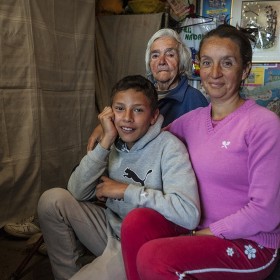Lilli Tnaib – UNHCR
 Until my trip to Haiti two years ago, I had yet to encounter some of the most heart-wrenching realities faced by millions of displaced women and mothers around the world. But after meeting Bernadette*, a young mother displaced by the devastating 2010 earthquake, I quickly learned that they are some of the most vulnerable yet resilient people in the world.
Until my trip to Haiti two years ago, I had yet to encounter some of the most heart-wrenching realities faced by millions of displaced women and mothers around the world. But after meeting Bernadette*, a young mother displaced by the devastating 2010 earthquake, I quickly learned that they are some of the most vulnerable yet resilient people in the world.
After the earthquake in Haiti, 1.5 million people were displaced inside the country. In Haiti, the visual of women affected by disaster – mothers holding their children – was striking. Some had lost their children in the earthquake; others clung to them as they had begun to rebuild their lives. Many lived in congested tent cities, like urban slums spread across the city. The women I met in Haiti didn’t have the same security that I had as the mother of two young children.
After the earthquake, violence against women and children skyrocketed. I met Bernadette, a 30 year old mother of three children, at a safe house for vulnerable women. Bernadette lived there with other women and girls who have been raped, forced into prostitution or engaged in survival sex in exchange for food to feed their children. Bernadette was raped three times in the camp. After telling me about each rape, she recalled, “When I was in the camp, I didn’t feel like I was living. I was always scared and I would stay in my tent out of fear that I would be attacked again.”
It was a startling moment to look into another mother’s eyes who didn’t have what I have – the most basic things to raise a child – safety and shelter.
Bernadette is one of thousands who experienced horrific violence in the lawlessness that followed the earthquake. She was removed from the camp with her children, ages 15, 12 and 9 through an initiative between UNHCR and KOFAVIV, a grassroots women’s organization run by and for survivors of sexual violence. The two organizations founded one of the few safe house programs in Port-au-Prince.
After receiving medical and counseling support, Bernadette told me that she finally felt safe. “When I first got here, I couldn’t sleep. Every time I heard a noise, I jumped. I was nervous. Now I sleep peacefully.” She also said, smiling, this safety brings her a bit of happiness in her heart that she did not feel before.
She told her story without shedding a tear, full of strength and courage. She was clearly on the road to recovery. I couldn’t help but listen to her from the point of view of a mother. I was sad for her, proud of her, but mostly hopeful for her. She has endured more than I can imagine.
*Name changed…
Lilli Tnaib
Public Information Associate
Washington, DC









